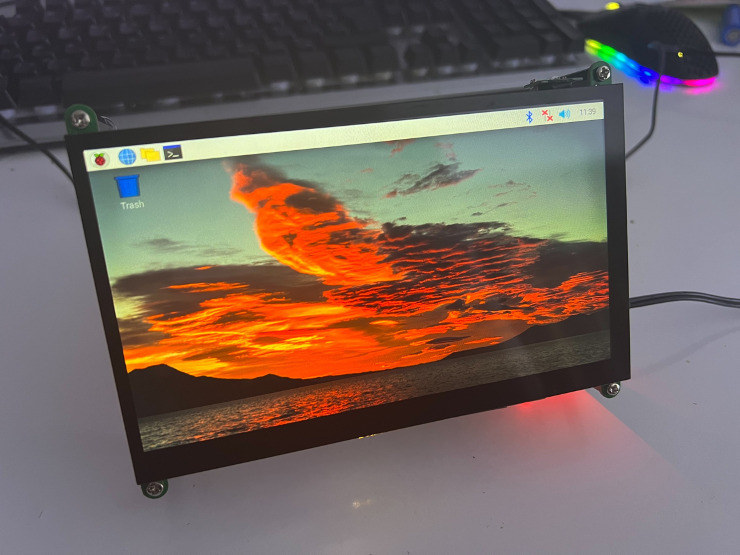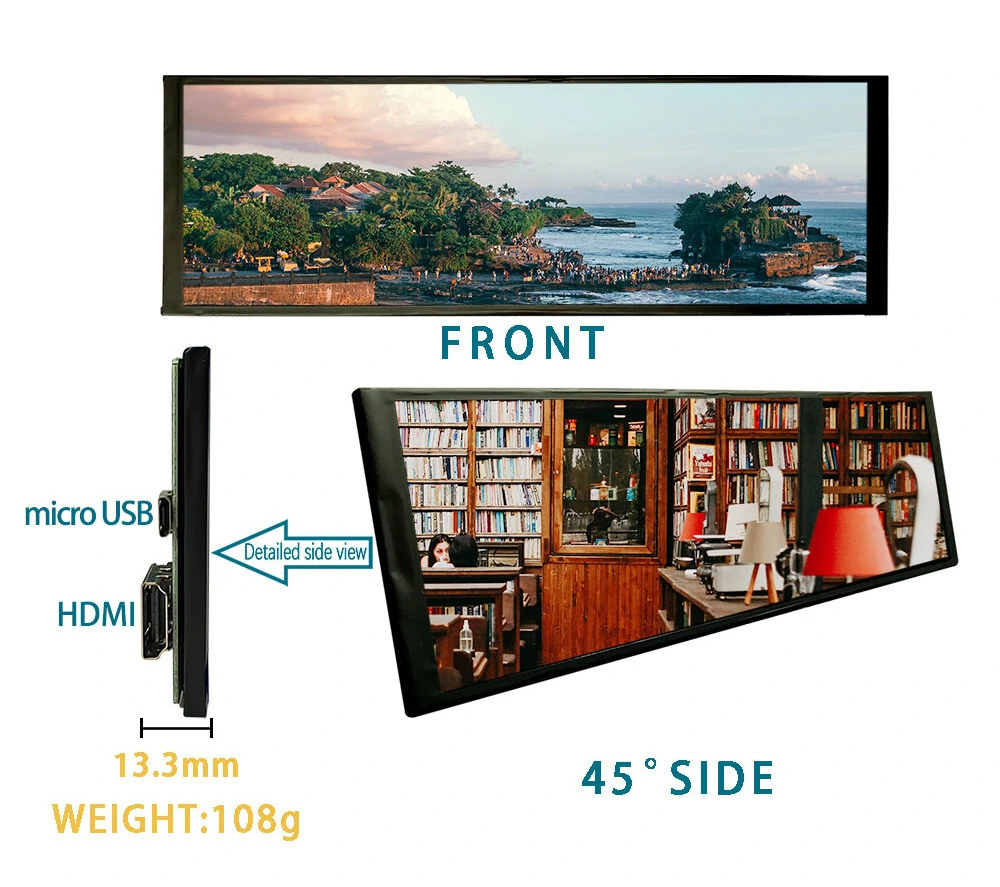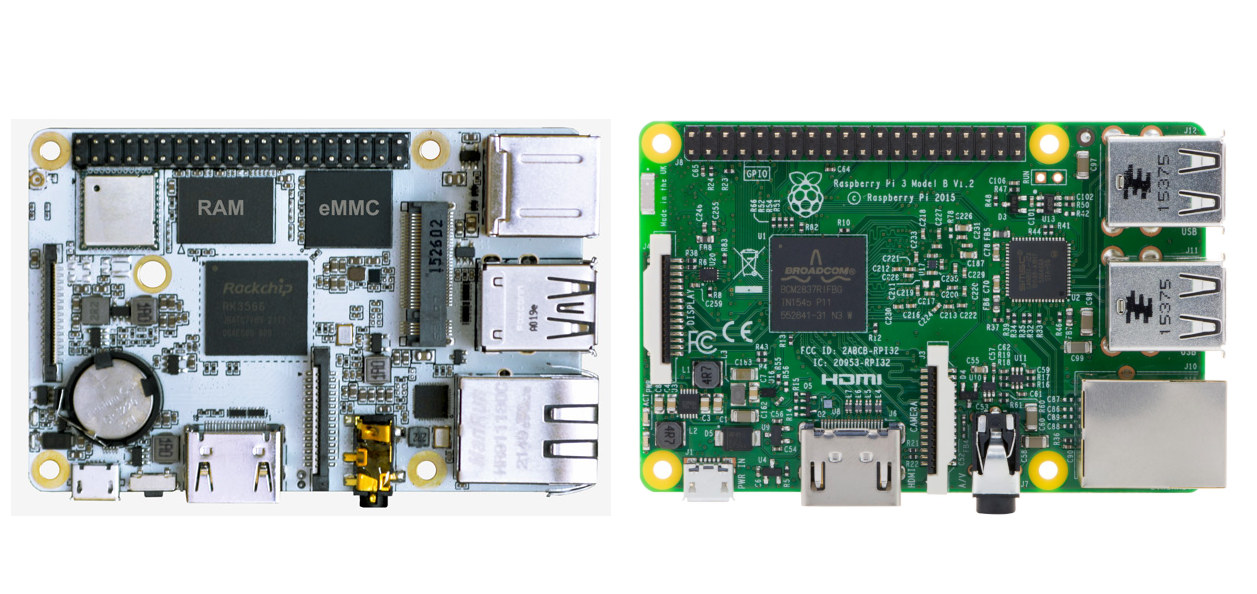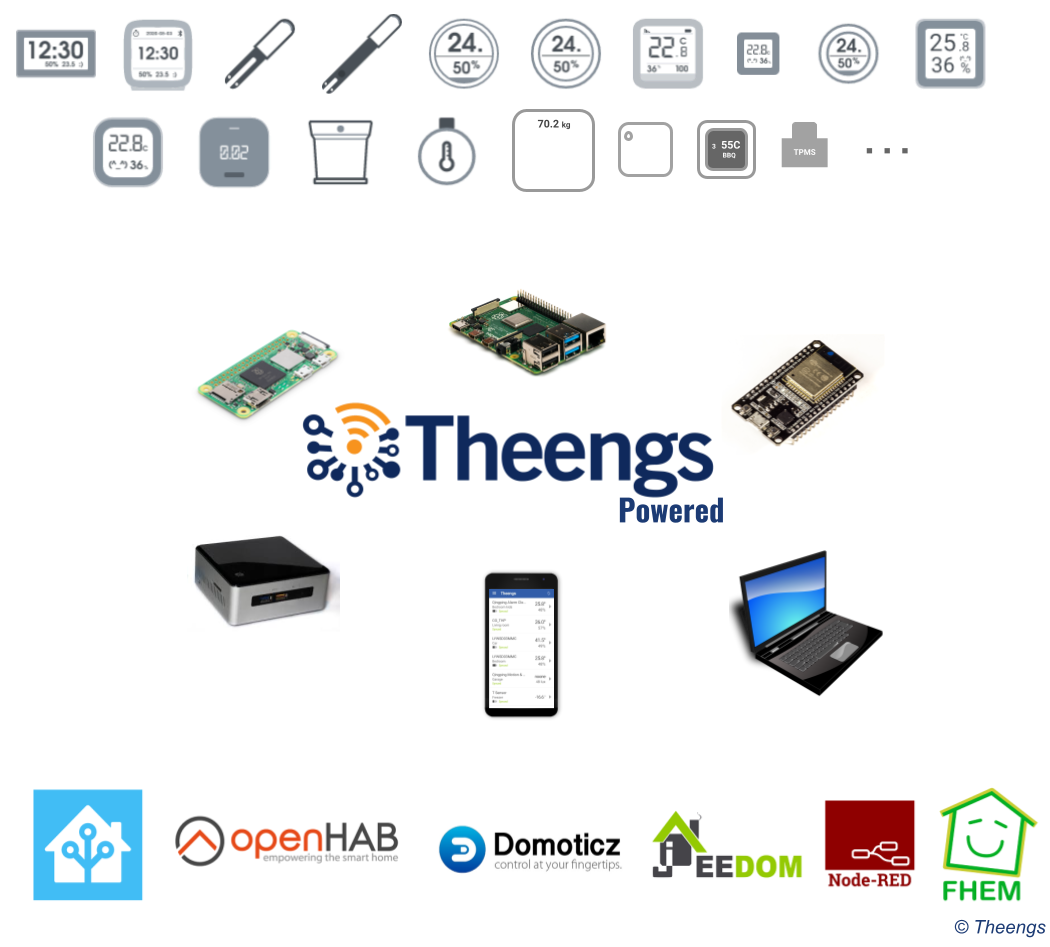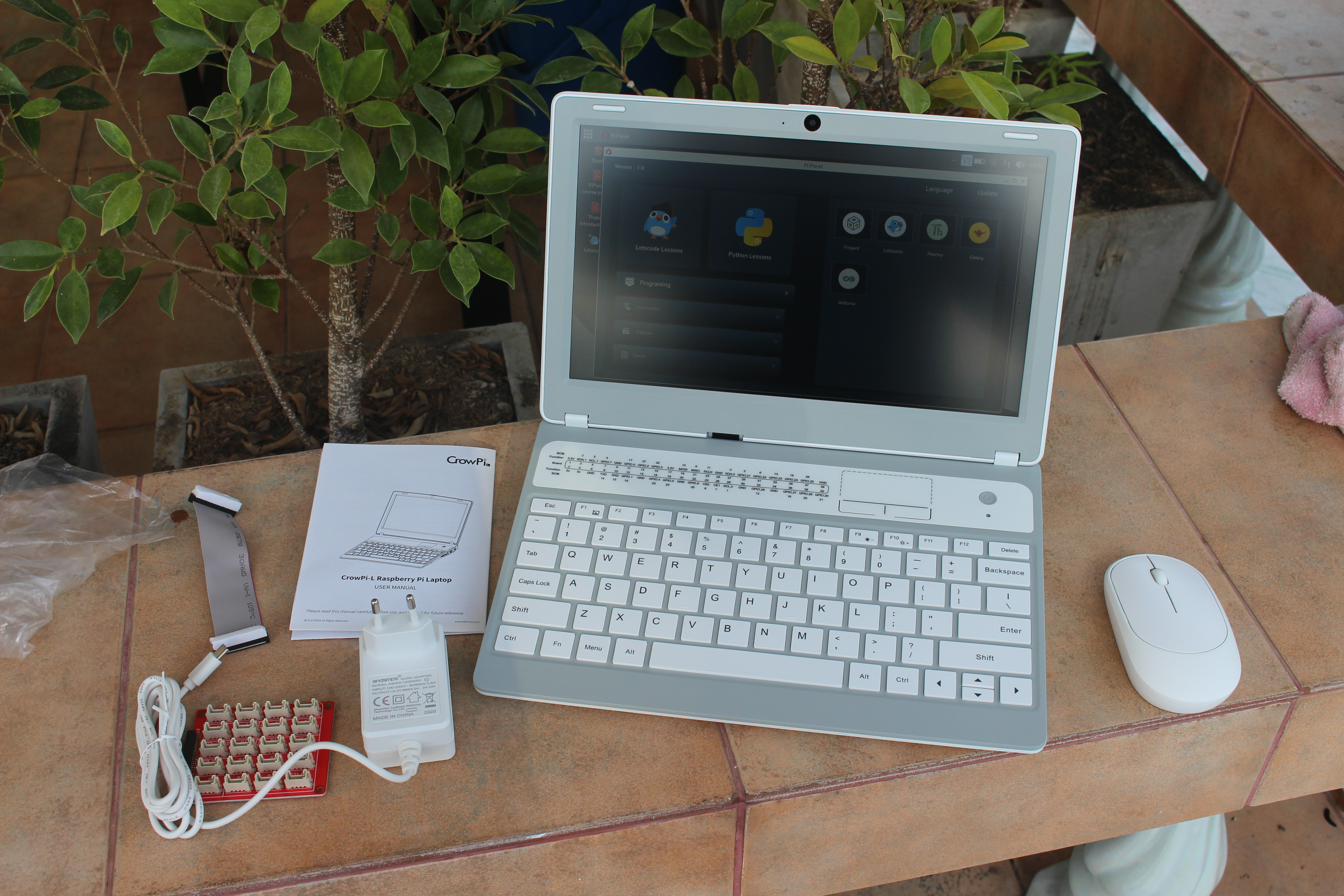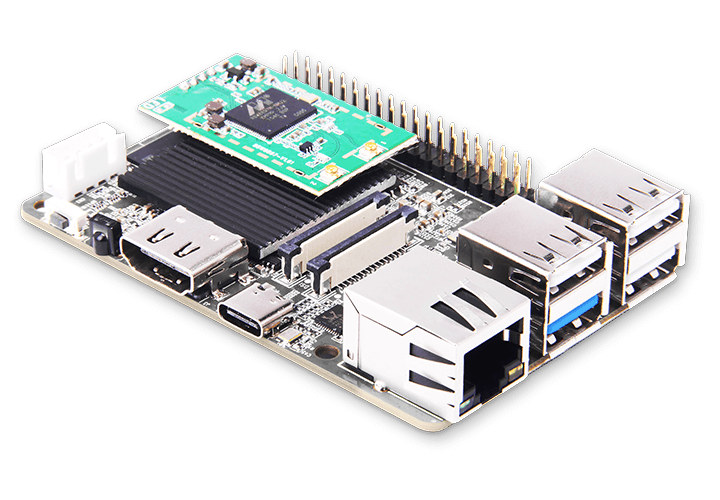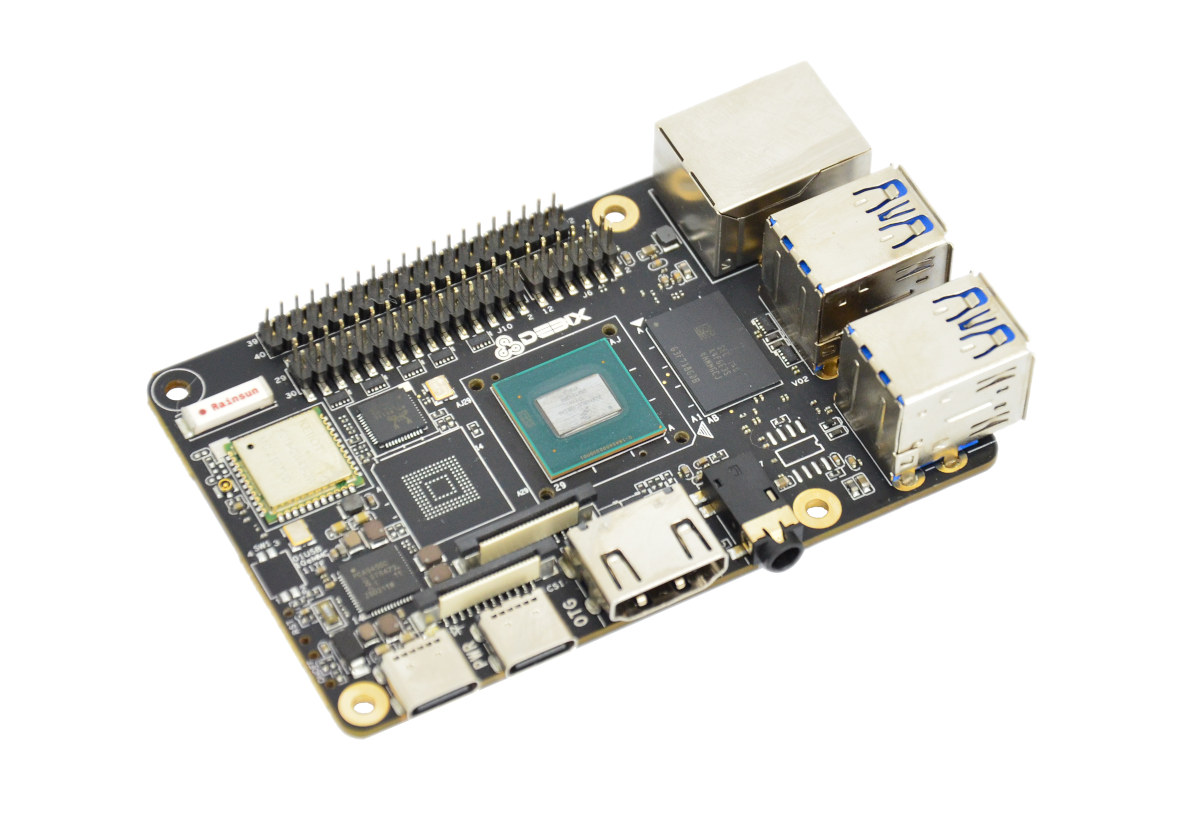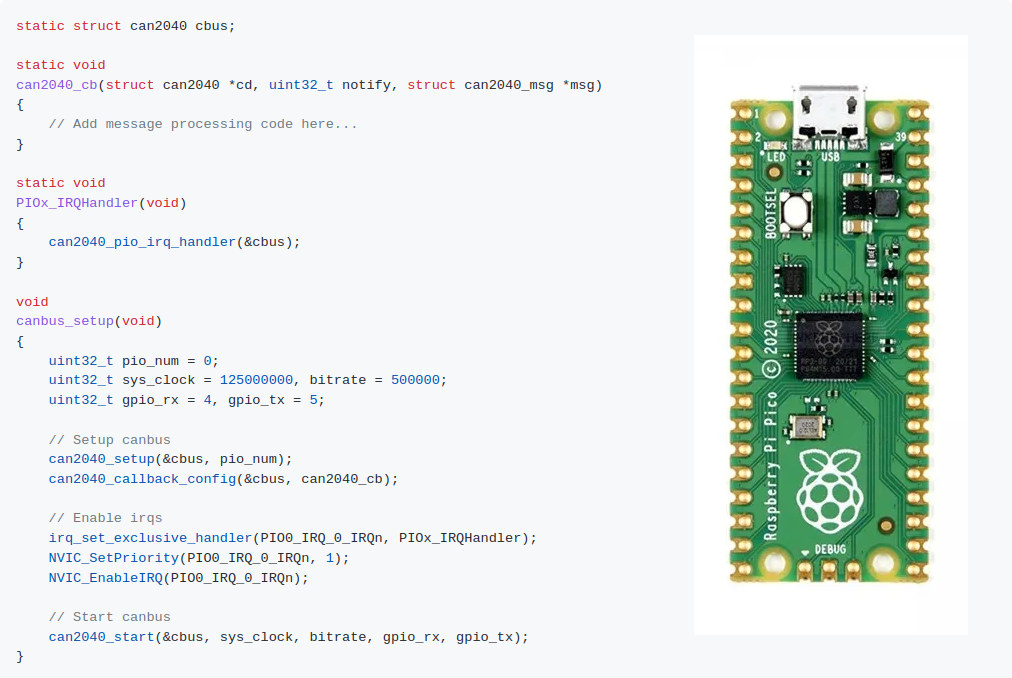Unboxing SunFounder TS7-Pro touchscreen display SunFounder TS7-Pro is a 7-inch touchscreen display designed for Raspberry Pi 4 board and the company sent us one review sample for evaluation. SunFounder has a wide range of Raspberry Pi and Arduino accessories designed for makers, and the TS7-Pro 7 is their latest offering that’s optimized to work with Raspberry Pi 4 and Raspberry Pi 3. Adding a touchscreen display to a Raspberry Pi may be a bit messy with the display or other accessories such as cameras and/or 2.5-inch drive spread on the table, but the TS7-Pro display simplifies all that with a neater assembly. Let’s start the review with an unboxing The package is compact and the display is well-protected with polyethylene foam to reduce the risk of damage during transport. Accessories such as cables, screws and nuts, adapters, an acrylic enclosure, and a screwdriver are also included in the package. Here’s […]
7.9-inch ultrawide HDMI display works with Raspberry Pi SBC
If you are looking for an ultrawide display to show information on your PC or Raspberry Pi, there’s a 7.9-inch IPS display with 1280×400 resolution that may meet your requirements. The display is powered through a USB port and takes a video source from its HDMI 1.4 input port, so it should work with any hardware equipped with HDMI output and a USB port. LR79 display specifications: Display – 7.9-inch TFT-LCD IPS display with 1280×400 resolution @ 60Hz, no touch function 178° field of view 5:16 aspect ratio Response Time: 40ms(Typ.)(Tr+Tf) Contrast Ratio: 900:1 Brightness: 500cd/㎡ Color Gamut: 70% NTSC Display Colors: 16.7M Backlight: WLED (19.2V) Connector: 30-pin ZIF Display Input – HDMI 1.4 Power Supply – 5V via micro USB port Dimensions 205.8 x 67.6 x 13.3 mm Active Area – 190.08 x 59.40 mm Weight – 108 grams The display should work with any host with HDMI output, […]
Compact3566 – A Rockchip RK3566 SBC that closely follows Raspberry Pi 3 form factor
We’ve very recently written about Geniatech XPI-3566 SBC powered by Rockchip RK3566 CPU that somewhat follows the Raspberry Pi 3 Model B form factor. Boardcon Compact3566 offers similar features, but it appears to keep exactly the same port assignment as the Raspberry Pi SBC, so it should be compatible with more accessories. The Compact3566 SBC ships with up to 8GB LPDDR4 and 128GB eMMC flash, features Gigabit Ethernet & WiFi 5, four USB 3.0/2.0 ports, HDMI 2.0 output, MIPI DSI and CSI interfaces, the 40-pin GPIO header, as well as extra built-in features such as an M.2 socket for storage, RTC with battery, and a built-in microphone. Compact3566 specifications: SoC – Rockchip RK3566 quad-core Arm Cortex-A55 @ up to 1.8 GHz with ARM Mali-G52 2EE GPU with support for OpenGL ES 1.1/2.0/3.2. OpenCL 2.0. Vulkan 1.1, 0.8 TOPS NPU System Memory – 2GB, 4GB, or 8GB LPDDR4/LPDDR4X Storage 8GB, 16GB, […]
Theengs open-source tools to decode BLE sensors work on ESP32, Raspberry Pi, Android phone, etc…
Theengs is a manufacturer agnostic open-source set of tools to decode BLE sensors and integrate those into smart home and IoT solutions such as Home Assistant with notably support for autodiscovery to automatically create the sensor. Theengs can be installed on various hardware from ESP32 to an Android phone or a Raspberry Pi SBC, and the solution currently supports close to forty BLE sensors from various companies including Xiaomi, Honeywell, and RuuviTag. There are six components: The Theengs Decoder library developed in C++ for portability and translating data from sensors into human-readable data using the JSON format. The Python-based Theengs Gateway acting as a BLE to MQTT bridge for Home Assistant, OpenHAB, and NodeRED integration. It relies on the Theengs Decoder library and publishes the sensors broadcasted BLE information to an MQTT broker. The OpenMQTTGateway is also BLE to MQTT bridge, but instead of targetting Linux-capable hardware like Raspberry […]
CrowPi L Raspberry Pi 4 laptop review – Part 1: Unboxing and teardown
Elecrow CrowPi L is an 11.6-inch laptop shell based on Raspberry Pi 4 designed for STEM education with optional electronics modules and tutorials. That’s an evolution of the CrowPi 2 laptop I reviewed in 2020 with a thinner design and more flexible since the electronics modules are optional, so it can serve the market of people just wanting a Raspberry Pi 4 laptop. The company has sent me a full “CrowPi L Advanced Kit” for review with the CrowPi L laptop fitted with a Raspberry Pi 4, as well as the Crowtail Starter Kit for Raspberry Pi. CrowPi L Advanced Kit Unboxing Let’s check out the laptop package first. Since in this design, the laptop comes with a battery, and mine already had a Raspberry Pi 4 installed, I could just turn it on immediately. Accessories include a wireless mouse, a 12V/2A power supply (with USB Type-C plug… this should […]
Geniatech XPI-3566 is a business-card sized Rockchip R3566 SBC
Geniatech has added a new member to its XPI SBC family with the business card-sized XPI-3566 board powered by a Rockchip RK3566 quad-core Cortex-A55 processor, and mostly following the Raspberry Pi 3 form factor like its predecessors. The single board computer comes with 1GB to 8GB RAM, up to 64GB eMMC flash, HDMI 2.0 video output, Gigabit Ethernet, dual-band WiFi, a few USB ports, and a 40-pin GPIO header. It is said to target retail, “interactive communication”, and education applications. Geniatech XPI-3566 specifications: SoC – Rockchip RK3566 quad-core Cortex-A55 processor @ up to 1.8 GHz with Arm Mali-G52 2EE GPU, 0.8 TOPS AI accelerator System Memory – 2GB DDR (1GB, 4GB, or 8GB optional) Storage 16GB eMMC flash (8GB, 32GB, 64GB optional) MicroSD card socket Video Output HDMI 2.0 up to 4Kp60 MIPI DSI connector (not listed in the specs, but it can clearly be seen on the board) Camera […]
DEBIX Model A – A Raspberry Pi-inspired NXP i.MX 8M Plus SBC for AI applications
DEBIX Model A is a single board computer powered by an NXP i.MX 8M Plus quad-core Cortex-A53 processor with a 2.3 TOPS AI accelerator in a form factor that combines Raspberry Pi 4 and 3 Model B designs. The SBC comes with up to 6GB RAM, a microSD card slot, an optional eMMC flash of up to 128GB capacity, HDMI 2.0a, LVDS, and MIPI DSI display interfaces, a MIPI CSI camera interface, Gigabit Ethernet and WiFi 5 connectivity, plus a 40-pin GPIO expansion header. DEBIX Model A specifications: SoC – NXP i.MX 8M Plus quad-core Cortex-A53 @ up to 1.6 GHz (industrial) or 1.8 GHz (commercial), with Arm Cortex-M7 @ up to 800 MHz, Vivante GC7000UL 3D GPU, Vivante GC520L 2D GPU, 2.3 TOPS NPU System Memory – 2GB LPDDR4 (4GB/6GB optional) Storage – Default: Micro SD card; optional 8GB, 16GB, 32GB, 64GB, or 128GB eMMC flash Video Output HDMI […]
can2040 project adds software CAN bus to Raspberry Pi RP2040 microcontroller
The can2040 project is a software CAN bus implementation for the Raspberry Pi RP2040 microcontroller that leverages programmable I/Os (PIO) to achieve reading and writing CAN 2.0B data frames at rates up to 1Mbit per second. Kevin O’Connor, the developer of the project, further explains the implementation uses only one of the two RP2040 PIO hardware blocks, so it is possible for a single Raspberry Pi RP2040 chip to have two separate CAN bus interfaces. Some processing also happens on one of the Arm Cortex-M0+ cores of the microcontroller with the processing time dependent on the amount of bus traffic, and a fully saturated CAN bus at the fastest supported rate of 1Mbit/s may use up to around 30% of that core when clocked at 125MHz, so that should still leave plenty of room for other tasks that may run on the system. I could not find any information about […]


